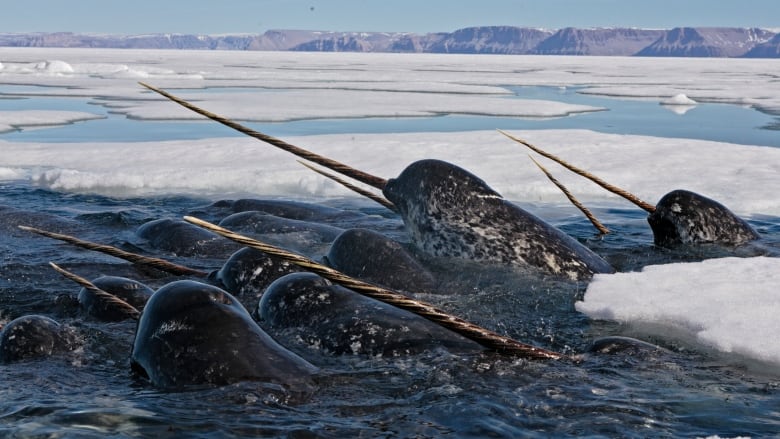Narwhals have survived 1 million years despite low genetic diversity: study

The narwhal has survived as a species for one million years, despite having low genetic diversity — a discovery that has scientists scratching their heads.
Eline Lorenzen, an associate professor and curator of mammals at the Natural History Museum of Denmark at the University of Copenhagen, is a co-author in a recent study that lays out the findings.
She says the narwhal’s resiliency over its evolutionary history is surprising because that’s not something generally seen in species with low genomic diversity.
“If you think of it as a toolbox that you have at home where you have lots of different tools in case something happens at your home … the more tools you have available in your toolbox, the higher chances you’ll have the correct tools to fix whatever’s going on,” Lorenzen said.
“Now the narwhal, it looks as if it has a toolbox with just not very many tools, yet it’s been able to fix whatever it has needed to fix throughout its evolutionary history.”

Generally, Lorenzen said, a species will only display low genetic diversity after an event causes a population to crash, or a subset of a species establishes itself in a new area.
She said scientists understand why narwhals have low genetic diversity — they have a very low population of approximately 170,000 across Arctic waters. The mystery is how they’ve been able to survive for so long.
“We hypothesized that the species, because it’s had such low diversity for so long, has somehow adapted to surviving with that low diversity.”
But Joanasie Mucpa, an elder who lives in Pond Inlet, Nunavut (Canadian eastern Arctic), where the world’s largest population of narwhal migrates every summer, has another theory. He suggested the narwhal may have adapted over its evolutionary history through migration.
“The animals follow their food all the time,” he explained.
Lorenzen said her team didn’t speak to local Inuit populations for this particular study.
Unexpected discovery
The genome discovery itself came as a bit of a surprise to Lorenzen’s research team. They were sequencing the genome of the narwhal and comparing it with DNA from ancient narwhal specimens “to see what is a narwhal and what is not,” she said.
“Then we got this super interesting finding of it having a really unique evolutionary trajectory.”
The question now is, with such a low genomic diversity, how well will narwhals be able to adapt to a changing Arctic climate?
Lorenzen explained a species will either go extinct, move to a new location or adapt to a changing environment. With the narwhal, she doesn’t know what to expect.
“Our concern is that, because of the low variation across the genome, the narwhal does not have a lot of opportunity to adapt,” she said.
Written by Randi Beers, based on interviews by Meagan Deuling and Myna Ishulutak
Related stories from around the North:
Canada: Effects on narwhal must be clarified before expanding iron ore mine in Arctic Canada, CBC News
Finland: Report lists hundreds more species as endangered in Finland, Yle News
Iceland: Scientists puzzled by right whale’s appearance off Iceland, CBC News
Norway: Icelandic whale sanctuary can’t offer safe haven to beluga freed from harness, Radio Canada International
United States: Southcentral Alaska: In death, beached humpack whale offers clues, research samples, food, Alaska Public Media



